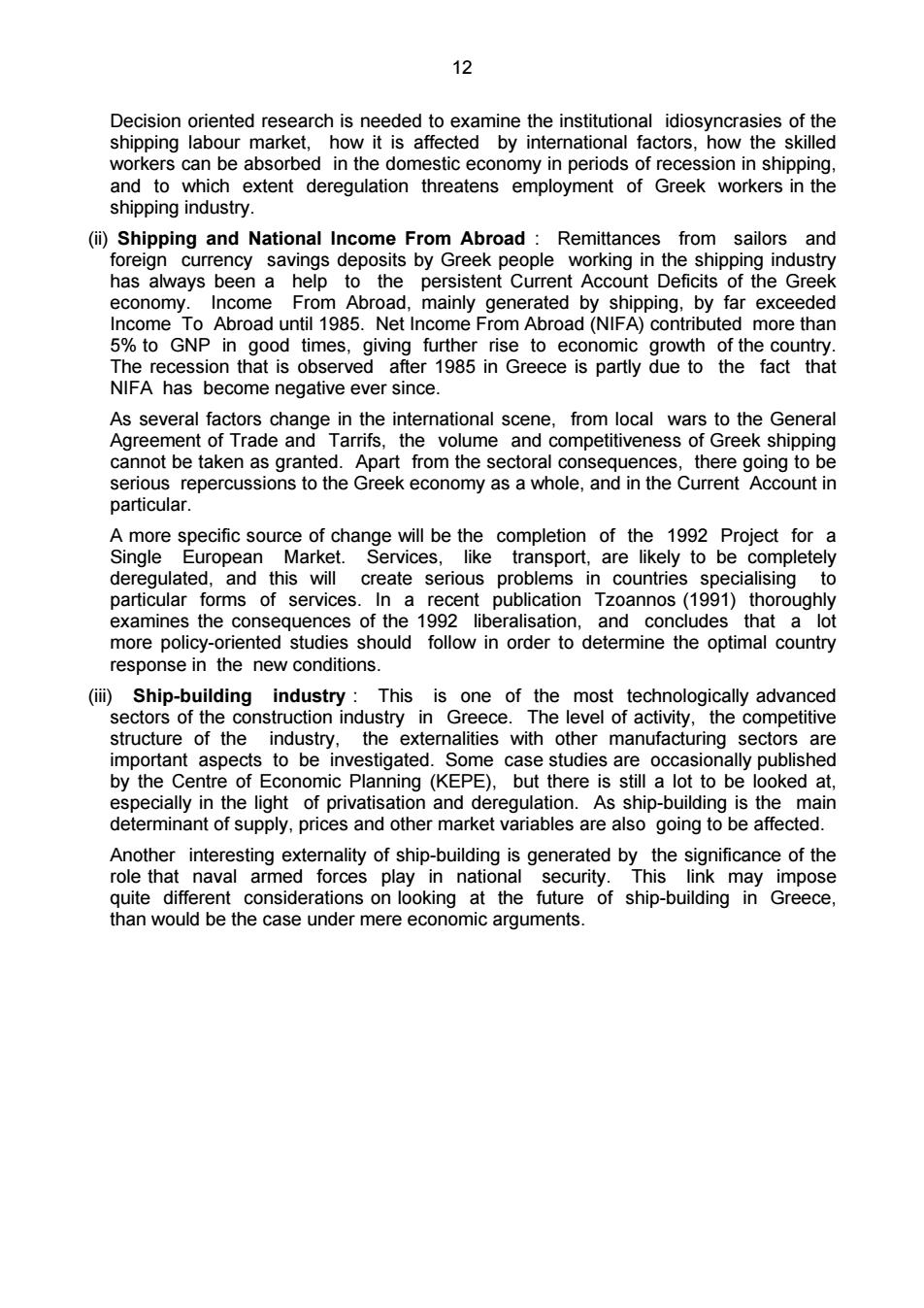正在加载图片...

12 Decision oriented research is needed to examine the institutional idiosyncrasies of the shipping labour market,how it is affected by international factors,how the skilled workers can be absorbed in the domestic economy in periods of recession in shipping, and to which extent deregulation threatens employment of Greek workers in the shipping industry. (ii)Shipping and National Income From Abroad Remittances from sailors and foreign currency savings deposits by Greek people working in the shipping industry has always been a help to the persistent Current Account Deficits of the Greek economy.Income From Abroad,mainly generated by shipping,by far exceeded Income To Abroad until 1985.Net Income From Abroad(NIFA)contributed more than 5%to GNP in good times,giving further rise to economic growth of the country. The recession that is observed after 1985 in Greece is partly due to the fact that NIFA has become negative ever since. As several factors change in the international scene,from local wars to the General Agreement of Trade and Tarrifs,the volume and competitiveness of Greek shipping cannot be taken as granted.Apart from the sectoral consequences,there going to be serious repercussions to the Greek economy as a whole,and in the Current Account in particular. A more specific source of change will be the completion of the 1992 Project for a Single European Market.Services,like transport,are likely to be completely deregulated,and this will create serious problems in countries specialising to particular forms of services.In a recent publication Tzoannos (1991)thoroughly examines the consequences of the 1992 liberalisation,and concludes that a lot more policy-oriented studies should follow in order to determine the optimal country response in the new conditions. (ii)Ship-building industry:This is one of the most technologically advanced sectors of the construction industry in Greece.The level of activity,the competitive structure of the industry,the externalities with other manufacturing sectors are important aspects to be investigated.Some case studies are occasionally published by the Centre of Economic Planning(KEPE),but there is still a lot to be looked at, especially in the light of privatisation and deregulation.As ship-building is the main determinant of supply,prices and other market variables are also going to be affected. Another interesting externality of ship-building is generated by the significance of the role that naval armed forces play in national security.This link may impose quite different considerations on looking at the future of ship-building in Greece, than would be the case under mere economic arguments.12 Decision oriented research is needed to examine the institutional idiosyncrasies of the shipping labour market, how it is affected by international factors, how the skilled workers can be absorbed in the domestic economy in periods of recession in shipping, and to which extent deregulation threatens employment of Greek workers in the shipping industry. (ii) Shipping and National Income From Abroad : Remittances from sailors and foreign currency savings deposits by Greek people working in the shipping industry has always been a help to the persistent Current Account Deficits of the Greek economy. Income From Abroad, mainly generated by shipping, by far exceeded Income To Abroad until 1985. Net Income From Abroad (NIFA) contributed more than 5% to GNP in good times, giving further rise to economic growth of the country. The recession that is observed after 1985 in Greece is partly due to the fact that NIFA has become negative ever since. As several factors change in the international scene, from local wars to the General Agreement of Trade and Tarrifs, the volume and competitiveness of Greek shipping cannot be taken as granted. Apart from the sectoral consequences, there going to be serious repercussions to the Greek economy as a whole, and in the Current Account in particular. A more specific source of change will be the completion of the 1992 Project for a Single European Market. Services, like transport, are likely to be completely deregulated, and this will create serious problems in countries specialising to particular forms of services. In a recent publication Tzoannos (1991) thoroughly examines the consequences of the 1992 liberalisation, and concludes that a lot more policy-oriented studies should follow in order to determine the optimal country response in the new conditions. (iii) Ship-building industry : This is one of the most technologically advanced sectors of the construction industry in Greece. The level of activity, the competitive structure of the industry, the externalities with other manufacturing sectors are important aspects to be investigated. Some case studies are occasionally published by the Centre of Economic Planning (KEPE), but there is still a lot to be looked at, especially in the light of privatisation and deregulation. As ship-building is the main determinant of supply, prices and other market variables are also going to be affected. Another interesting externality of ship-building is generated by the significance of the role that naval armed forces play in national security. This link may impose quite different considerations on looking at the future of ship-building in Greece, than would be the case under mere economic arguments